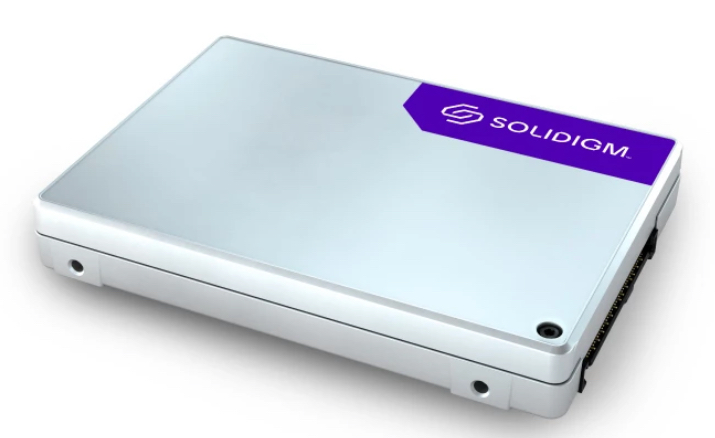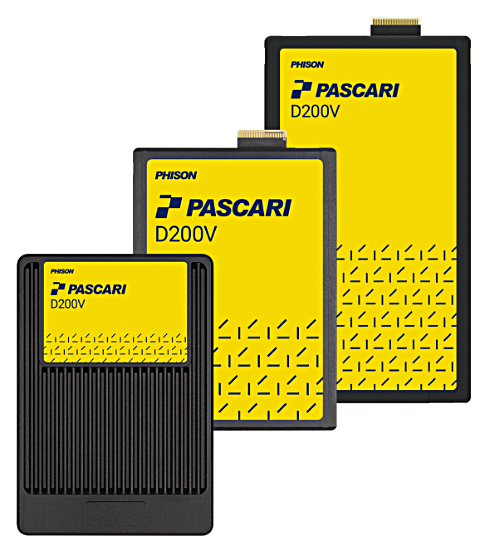Solidigm has announced a 122 TB version of its D5-P5336 SSD the same day that Phison announced a Pascari D205V SSD with the exact same capacity.
Update: Phison drive capacity corrected to 122.88TB.
The Phison drive is faster as it uses the PCIe 5 bus, with 32 Gbps link bandwidth, twice as fast as the gen 4 PCIe link used by Solidigm’s SSD.

Greg Matson, SVP of Strategic Planning and Marketing at Solidigm, said: “This massive capacity SSD is a game-changer – using far fewer watts per terabyte and freeing up valuable energy for other datacenter and edge power priorities.”
Solidigm says it has shipped more than 100 EB (exabytes) of QLC-based product since 2018, and this new drive “is designed by the pioneers of QLC, so can be deployed with confidence.”
The performance details are: 930,000 random read IOPS, 25,000 random write IOPS, 7.4 GBps sequential read and 3.2 GBps sequential write bandwidth. We understand that, like the existing D5-P5336 drives, the new one uses 192-layer 3D NAND in QLC (4bits/cell) format.

The highest-capacity SSDs from competing suppliers Samsung, Micron, and Western Digital are at the 60 TB level. With AI training and inference workloads needing fast access to larger and larger datasets, and GPUs taking an increasing share of datacenter electricity supply, having higher-capacity SSDs that customers can plug into existing PCIe gen 4 servers should be a benefit.
Solidigm says its new drive means you can store up to 4 PB of data per rack unit, extending the storage density enormously compared to disk drives, which max out around 35 TB in their 3.5-inch drive bays. The new drive also “improves power density at the edge with 3.4x more terabytes per watt versus 30 TB TLC.”
Dell’s Travis Vigil, SBP for ISG Product Management, said in a statement: “Dell Technologies believes that higher density provides the path to maximizing storage energy efficiency while minimizing datacenter footprint. As we strive towards density in our own solutions, we look forward to continued storage innovations like Solidigm’s new 122 TB D5-P5336 solid-state drive.”
The U.2 format D5-P5336 is sampling with customers now and an E1.L format version should be sampling in January 2025.
Phison’s Pascari D205V
Phison revealed its Pascari brand 64 TB D200V with a PCIe gen 5 interface in October. Now it has a D205V available for pre-order with a 122.88 TB capacity. The details are:

PCIe 5.0×4 (Single port)/PCIe 5.0 2×2 (Dual port), NVMe 2.0, ISE, TCG Opal Supported, NVMe-MI supported
- Power Loss Protection (PLP), 128 Namespaces, DWPD: 0.3, MTBF: 2.5 million hours
- Sequential Performance Up To:
- Read: 14,600 MBps
- Write: 3,200 MBps
- Random performance up to:
- Read: 3,000K IOPS (4K)
- Write: 35K IOPS (16K)
How does this compare to the Solidigm 122 TB drive? Excellently, as Phison’s SSD is much faster at random read and write IOPS and also sequential read bandwidth. Basically it leaves Solidigm in the dust, apart from sequential write speed where Solidigm is equal at 3.2 GBps, despite its slower PCIe gen 4 bus. It raises the question of how the Solidigm drive would perform with a PCIe gen 5 interface.

Michael Wu, GM and President, Phison US, banged the AI drum, stating: “With the acceleration in AI training and data-intensive workloads, there has been a tangible shift to a future-forward focus on storage as a critical component in capturing necessary volume to support data quality and integrity … Customers can essentially push past previous infrastructure barriers to continue to scale as the market demands.”
The Pascari D205V is available for pre-order now for expected shipping in early Q2 2025 in the U.2 and E3.L form factors.
Phison will be showing its aiDAPTIV+ Pro Suite at SC24. This is said to offer the first commercial end-to-end AI experience, processing “data from ingest to inference, providing a comprehensive software solution for training LLMs on-premises with customers’ domain specific data. Pro Suite delivers ease of use in domain training, while supporting data privacy, control, and affordability provided by aiDAPTIV+.”
Phison is also showing a PS7161 device, saying it’s the first PCIe gen 6 redriver available now for pre-order with expected shipping in Q1 2025.
Bootnote
Samsung talked about a 128 TB flash drive in August 2017 made with QLC flash. This was just talk at the time and it hasn’t actually appeared yet. Nimbus Data introduced a 100 TB ExaDrive SSD six years ago in May 2018. This had a 3.5-inch enclosure, a SATA interface, and was made from 2bits/cell MLC NAND. It was relatively slow, with 100,000 random read and write IOPS, and did not make much of an impression in the general SSD market. We envisage Micron, Samsung, Western Digital, and Kioxia will all produce 100 TB-plus SSDs in the next few months.








